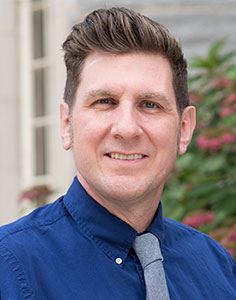Michael P. Boyle, Ph.D.

Professor
E-mail: Michael P. Boyle, Ph.D.Office: Main Hall 144 (through Spring 26)
Office phone: x2658
- Fall: MDC 211 (Intro to Sports Media Production); Spring: MDC 411 (Advanced Sports Media Production)
- Serving as Interim Associate Dean of College of Arts & Humanities
Dr. Boyle's (he/him/his) research focuses on how news media present issues to the public, how and why people use media, and the implications of news coverage and media use patterns on subsequent outcomes such as information seeking, public opinion, and perceptions of media effects, falling into two major areas. The first area of his research specifically addresses news treatment of protest groups and how such treatment affects participation in the political process. The second area of his research explores the processes underlying the third-person perception - a common pattern where people typically perceive others to be more affected by media than they are - and the resulting third-person effect, often characterized by support for censorship and other regulatory responses.
He is the co-author of the research methods textbook Applied Communication Research Methods: Getting Started as a Researcher (now in the 3rd edition) and the co-editor (with Dr. Adam Rainear) of Evolving Journalism Research Methods: Applications, Trends, Analyses, published in November, 2025. His work can be found in book chapters, invited volumes, and scholarly journals including Journalism & Mass Communication Quarterly, Mass Communication & Society, Journal of Broadcast & Electronic Media, Atlantic Journal of Communication, American Behavioral Scientist, International Journal of Press/Politics, and Journal of Communication, among others. Please check out his updated vitae for download in PDF format for a full list of publications and selected conference presentations.
His primary teaching areas include research methods and courses in video production (including sports media-related courses). Dr. Boyle developed the Sports Media Production certificate, which officially launched in Fall 2025. He also played a key role in creating the Media & Culture (MDC) major and minor programs, which are part of the Communication and Media Department. The minor began in Fall 2017 and the major launched in Fall 2018.
At Fall 2011 commencement, Dr. Boyle received the E. Riley Holman Memorial Faculty Award given to a WCU faculty member who uses innovative teaching techniques that foster student creativity. Dr. Boyle was previously the Television Station Faculty Coordinator for Verizon Channel 33: WCCTV (West Chester Community Television). He helped to found the station, which represents a partnership between WCU and West Chester Borough and provides an excellent opportunity for students interested in television and video production to reach a larger audience. The station hit the airwaves in May of 2012.
Dr. Boyle received his B.A. in Media Studies from East Stroudsburg University, his M.A. in Mass Communication from the University of Delaware, and his Ph.D. in Journalism & Mass Communication from the University of Wisconsin at Madison. Dr. Boyle happily joined the faculty of West Chester University in 2006.
Recent & representative publications (full list in CV linked above):
Oeldorf-Hirsch, A., Schmierbach, M., Boyle, M.P., & Appelman, A. (2024). The influence of fact-checking is disputed!: The role of party identification in processing and sharing fact-checked social media posts. American Behavioral Scientist, 68(10), 1345-1365. doi.org/10.1177/00027642231174335
Boyle, M.P. (2022). Protesting white supremacy: Race and the status quo in news coverage of the anti-segregation rallies in Forsyth County, Georgia. Atlantic Journal of Communication, 30(5), 451-466. doi.org/10.1080/15456870.2021.1951267
Abdel-Sama, M., Boyle, M.P., Flanigan, S., Garland, C., Jefferson, T., Jeffery, B., Maidhof, C., & Sotiropoulos, G. (2021). Legacies of content: Revisiting the 2011 protest wave. Contention, 9(2), 49-63. doi.org/10.3167/cont.2021.090204
Oeldorf-Hirsch, A., Schmierbach, M., Appelman, A., & Boyle, M.P. (2020). The ineffectiveness
of fact-checking labels on news memes and articles. Mass Communication & Society, 23(5), 682-704. doi.org/10.1080/15205436.2020.1733613
Schmierbach, M., & Boyle, M.P. (2020). Concrete examples of abstract others: Testing
exemplar availability as an additional explanation for third-person perceptions. International Journal of Public Opinion Research, 32(3), 510-529. doi.org/10.1093/ijpor/edz032
Oeldorf-Hirsch, A., Schmierbach, M., Appelman, A., & Boyle, M.P. (2018). For the Birds: Media Sourcing, Twitter, and the Minimal Effect on Audience Perceptions. Convergence, 26(2), 350-368. doi.org/10.1177/135485651878
Boyle, M.P., & McLeod, D.M. (2018). News framing and social protest: Toward a comprehensive model. In P. D'Angelo (Ed.), Doing News Framing Analysis 2: Empirical and Theoretical Perspectives. New York: Routledge.
Boyle, M.P. (2015). A tale of two sites: Journalist perspectives and patterns in coverage of Occupy Wall Street. Contention: The Multidisciplinary Journal of Social Protest, 3 (1), 17-35. doi.org/10.3167/cont.2015.030102
McLeod, D.M., Shah, D.V., Schmierbach, M.G., Boyle, M.P., & Armstrong, C.L. (2015). Group perceptions and expressive action. In D.M. McLeod and D.V. Shah (Eds.), Covering “Big Brother”: How News Frames Shape Support for National Security (pp. 143- 156), New York: Cambridge University Press.
Boyle, M.P., Schmierbach, M., & McLeod, D.M. (2013). Pre-existing factors or media effect?: Understanding the third person perception. Atlantic Journal of Communication, 21(4), 230-246. doi.org/10.1080/15456870.2013.823967
